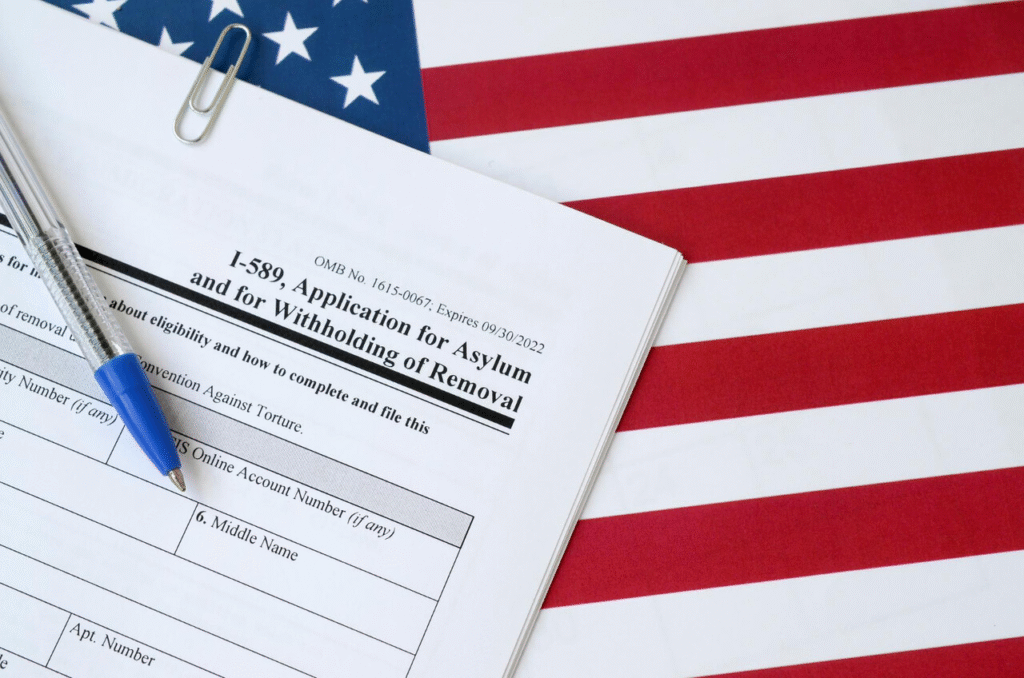Seeking asylum in the United States offers protection to individuals who fear returning to their home country due to persecution. However, gaining asylum isn’t as simple as just applying. There are clear laws and legal requirements you must meet to qualify, and consulting an experienced immigration lawyer can help you understand these rules. In this guide, we’ll explain the top 5 requirements for asylum eligibility and outline the application process in simple terms.
- Be Present in the U.S. or at a Port of Entry
To apply for asylum in the United States, you must be physically present within the country or seeking entry at a U.S. border or airport. It is not possible to apply for asylum in another country. This requirement applies to all individuals regardless of whether they entered the country legally or without documentation. As long as you are on U.S. soil or at its border, you are eligible to submit an asylum claim.
- Apply Within One Year of Arrival (File Form I-589)
Under U.S. immigration law, you are required to apply for asylum within one year of your arrival in the United States. This deadline is strictly enforced by both U.S. Citizenship and Immigration Services (USCIS) and immigration judges. Failing to file within this time frame may result in the denial of your asylum application.
However, there are limited exceptions to this rule. If you apply after the one-year deadline, you must be able to demonstrate either exceptional circumstances or changed conditions that justify the delay in filing.
- Prove a Well-Founded Fear of Persecution
To qualify for asylum in the United States, you must show that you have suffered past persecution or have a well-founded fear of future persecution in your home country. This persecution must be serious and harmful, personally targeted, and life-threatening or a threat to your freedom. General discrimination is not enough; it must involve significant harm based on your identity or beliefs. Acts such as physical violence, threats, torture, or imprisonment may qualify. It is also important to provide evidence and a clear explanation of how your experience meets these standards under U.S. asylum law.
- The Persecution Must Be Based on Protected Grounds
To be eligible for asylum in the United States, your fear of persecution must be based on one of five protected grounds: race, religion, nationality, political opinion, or membership in a particular social group. Race includes targeting based on ethnicity or skin color, while religion covers harm due to your beliefs or practices. Nationality refers to persecution tied to citizenship or ethnic identity. Political opinion applies to those persecuted for their views or activism. Membership in a particular social group includes people who share a core identity, such as domestic violence survivors. Your claim must connect the persecution to one of these categories.
- You Must Not Be Barred from Asylum
Even if you meet the basic eligibility criteria for asylum, such as having a well-founded fear of persecution based on race, religion, nationality, political opinion, or membership in a particular social group, you may still be barred from receiving asylum if certain disqualifying factors apply to your case. These bars are in place to ensure that individuals who pose risks or have committed serious offenses do not receive protection under U.S. asylum laws. The main reasons for ineligibility include:
- Persecution of Others
If you have assisted, ordered, or directly participated in the persecution of others, particularly on account of the same protected grounds for which asylum is sought, you are ineligible. For example, former members of oppressive regimes or militias involved in human rights violations can be denied asylum.
- Serious Non-Political Crimes
Individuals convicted of a serious crime that is not political, such as murder, rape, or major drug trafficking, are typically barred from asylum. The crime must be considered serious by U.S. standards, and convictions in other countries may also be evaluated.
- Threat to National Security
If the U.S. government determines that you pose a security risk or danger to the community, such as through terrorism related activities or espionage, your asylum application will be denied. This includes past involvement in terrorist organizations or acts.
- Previous Denial Without New Evidence
If your prior asylum application was denied by an immigration judge or the Board of Immigration Appeals, and you are applying again without presenting new and significantly changed circumstances or evidence, you may be automatically barred.
- Firm Resettlement in Another Country
If you were firmly resettled in another country before coming to the U.S, meaning you had an opportunity to live safely there with permanent legal status, you are not eligible for asylum. For example, someone who was granted refugee status in a third country and lived there for years before traveling to the U.S. will likely be disqualified.
Protection You Deserve with Abogada Kim Bruno
We are deeply committed to helping individuals escape persecution and find safety in the United States. If you’re facing threats to your life, freedom, or dignity in your home country, our experienced immigration team is here to guide you through every step of the asylum process, from filing your application to representing you in court.
We provide compassionate, one-on-one legal support tailored to your unique story.
Your journey to safety begins here.
Let Abogada Kim Bruno be your trusted advocate in seeking justice, freedom, and a future filled with hope.
